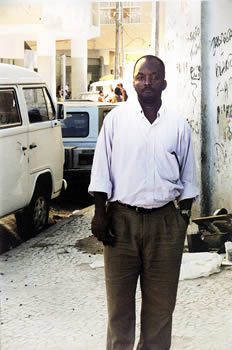You Are There: Friday Night in Rio De Janeiro, Looking for Inactive Members
by Geoffrey Biddulph

So Paulo Brazil Temple
Copyright 2002 IRI.
It’s a Friday night, and it’s time to look for inactive church members in the Jardim Botanico ward in Rio de Janeiro, Brazil.
One night a few weeks ago, I accompanied the ward’s Young Men’s President Nilson Marcos Elias de Jesus to Cruzada Sao Sebastiao, a sprawling apartment building complex on the edge of one of the nicest neighborhoods in Rio.
By U.S. standards, Cruzada would be considered one of the worst possible slums. The apartments are tiny, the size of large closets in the United States, and six-person families usually crowd into them. But in Rio de Janeiro literally millions of people survive in festering, crowded rickety slums built along the sides of stinking canals that have become open cesspools. In comparison, Cruzada looks like Beverly Hills.
Drowning in Temptations
Friday night is party night in Cruzada. Scores of children play in the streets weaving in and out of broken-down cars while their mothers sit drinking liter bottles of beer and their fathers hang out with friends. Drugs are sold openly. An occasional drunken brawl breaks out.
There are dozens of inactive church members in Cruzada. Most are people who felt the Spirit briefly and, in a burst of passion, decided to get baptized. Keeping them active is extremely difficult in a ward with a small group of priesthood holders — and so many temptations.

President Nilson in the Leblon neighborhood of Rio de Janeiro.
President Nilson says it best: “They don’t want to break the word of wisdom, but there’s smoking and alcohol all around them. They take one drink, and they’re gone. They just say to themselves that they can’t go back to church at all. Sometimes we can convince them to repent, but it’s hard. They convince themselves that they never felt the Spirit after all.”
Of course, there’s another factor: Cruzada is only three blocks from one of the most beautiful beaches in the world, Leblon. In Leblon, and on other nearby beaches, every sunny day offers the lure of men and women lounging in nearly nonexistent bathing suits while they contemplate azure seas and play soccer or volleyball. There is so much pleasure, and so many “good things” to enjoy. Why spend Sunday at a church, especially a church that asks you to go to three hours of services and says you can’t drink draft beer like everybody else and can’t drink Brazil’s famous coffee like everybody else and, worst of all, says you shouldn’t have fun on Sundays?
Rio is, after all, a city about having fun. The Carnival, usually in February, is a week-long party that involves nearly naked people filling the avenues to dance the samba, Brazilian street music. It is a late-night city where restaurants do not usually open until 8 p.m. and the cafes, bars and discos stay open all night. When Brazil won the soccer World Cup on June 30, the streets of Rio were literally packed with people drinking beer, waving Brazilian flags and celebrating. Church meetings had to be postponed for safety reasons, but it meant that hundreds of thousands of Saints in Brazil were watching the World Cup on a Sunday morning rather than going to church.
Beauty and Affliction
Rio is a city filled with so much beauty. Soaring above the city are majestic 2000-foot cliffs that look like Yosemite. Green jungles decorate the hills below the cliffs. And above it all stands the famous “Christ the Redeemer” statue, His arms spread wide as He ponders the mixture of sin and beauty below him.
Cariocas, the people from Rio, are famous for their unrelentingly positive outlook. The traditional Brazilian greeting, “Tudo bem?” (All is Well) fills the streets of Rio, and the people are almost never grouchy or depressed. After all, they say “God is Brazilian” and they cite as proof the fact that Brazil does not have any natural disasters, no tornados, no earthquakes and no hurricanes.
Rio is one of the most beautiful cities in the world, but it is also one of the most afflicted. Its poverty is staggering. Even the nicest neighborhoods are literally surrounded by slums that cling to the cliffs. The slums are completely dominated by drug gangs. In June, the drug gangs got upset with the local authorities and decided to send a message: they calmly drove up to City Hall and opened fire with machine guns on the building, breaking dozens of windows and leaving hundreds of bullet holes. Then they drove away. None of the bandits has been caught.
A Spiritual People
Still, Brazilians are among the world’s most spiritual people. I know of only one atheist or agnostic among the literally hundreds of people I work with. Studies show 93 percent of people belong to an organized religion. Nearly every taxi or truck carries a bumper sticker saying, “Jesus Saves” or “God is taking care of me.”
The fastest-growing religions are the large evangelical Protestant churches and the Church of Jesus Christ of Latter-day Saints. There are now four temples in Brazil, and Portuguese is the third-most-popular language spoken among Church members. Driving around Brazil, you see missionaries walking the streets nearly everywhere.
But Rio, with its beauty and its temptations, is a special challenge. More than 15 percent of the people in Rio, compared to seven percent nationwide, say they do not belong to an organized religion, by far the highest percentage in the country. Rio is first in worldly things and last in heavenly things.
The missionaries are certainly doing their jobs. A few years back, missionaries penetrated one of the crime-ridden slums near Jardim Botanico and baptized nearly 140 people in a few months. The current bishopric and missionaries in my ward have been unable to locate any of them. As far as we can determine, all of them are inactive.
In the last year, the missionaries have baptized nearly 40 people in my ward. Only about 10 of them are active. Many of the inactives live in Cruzada. President Nilson and I, and many other priesthood leaders, missionaries and sisters in the ward, try to visit them regularly to keep them coming to church.
Close to My Heart
One of the families that is closest to my heart is the Guimaraes family. About nine months ago, the father, mother and a teenager son and daughter all got baptized at the same time. They came to church for four Sundays in a row, all of them together. They said they were so happy to join a church as a family. The son and daughter participated in Mutual events. The son helped the ward win the stake trophy in a soccer tournament in which President Nilson served as coach. The son was so proud as he held that trophy.
And then one Sunday, I noticed that the father had the smell of cigarettes on his breath as I went to shake his hand. The next Sunday, nobody in the family showed up for church. President Nilson called the family, and home teachers went by the visit. Some of the sisters in the Relief Society also went. I went to see them twice. They were not there, but there were rumors that the father was unemployed and didn’t have time for church.
It’s been six months since anybody in the ward has seen them.
On this particular Friday night, President Nilson and I tried to visit the Guimaraes family again. We knocked on the door to their small apartment, but no luck.
Pedro
We did have luck visiting Pedro (not his real name), an 18-year-old semi-active member. Five years ago, Pedro got introduced to the church and was immediately impressed with what he learned. Pedro’s mother was dead-set against his baptism, but he was firm that he wanted to join the church, so she relented. For four years, Pedro went to church nearly every Sunday and went to seminary regularly.
Then, Pedro joined the rowing team of a nearby club. They held out promises that he might make the national team, so Pedro, a dedicated, athletic and studious young man, took his rowing seriously. But the coach said rowing required complete dedication, including regular practices on Sunday. That was more than a year ago. Since then, Pedro has stopped going to church regularly.
There are at least eight people in the ward who visit Pedro regularly. He looks healthy and is filled with his usual good humor. He always says the same thing: “next Sunday, I will go to church.” And he rarely comes.
When President Nilson and I visit Pedro, we note he is unusually thin. He was on a diet to get below 150 pounds (Pedro is about six-foot-two). He was happy to see us. He assured us he would go to church on Sunday (he didn’t go).
He was chatting via the internet with Leandro, a former missionary who is at BYU Idaho.
Pedro felt it necessary to explain himself. “You guys know I love the Gospel, don’t you?” President Nilson and I said yes.
“I talked to the coach, and I can’t get him to cancel Sunday practices. But I read the scriptures on my own. I am strong, very strong, in the Gospel,” he said. Nilson and I nodded.
“You know, there are so many temptations out there. You guys saw all those people in the streets outside. They’re drinking and smoking and doing drugs. I don’t do any of those things. I just stay in my room, away from the temptations. I have to get up at 5 a.m. to go rowing.”
“We know you’re a strong young man, Pedro,” Bishop Nilson said. “But Satan is everywhere. He’s trying to convince you that the things of the world are more important than the things of God.”
“You’re right, but I’m not doing anything wrong. I am firm in the Gospel,” Pedro says.
We both give him a hug and turn to leave. He sits back down to his computer, and clicks on a few windows. I glance at the computer briefly and see, “Brazil’s Best Pornography” displayed on the screen.
The enemy truly is relentless. Pedro avoided the temptations to do drugs like his friends, to drink and smoke like his friends. His living situation is filled with chaos and stress, yet he’s going to school and trying to do his best. He literally hides in his apartment to keep away from the temptations of the world. But the enemy gets to him, through one of the few portals left, the Internet.
There are so many temptations in Rio, so many reasons to go astray. It’s a constant struggle with a wily, persistent adversary. And the adversary seems to win so often.
Fasting Weekly
It can get discouraging for the small group of active church members at the ward. But something very interesting has happened in the last few months. Several of us have been fasting almost weekly and specifically asking the Lord to help our ward grow.
It is working. We have four missionaries, up from two a few months back, and lately there has been a baptism nearly every weekend. Just two months ago, another family, a mother, father and two daughters, got baptized. The Gaertners are ecstatic to be in the church together, and they come to church events several times a week. In June they fasted together as a family for the first time and said it was one of the most spiritual things they had ever done. The mother and father and the oldest daughter, 18, have all taken church callings and are extremely dedicated.
About the same time, another family moved into the ward. The husband, Francisco Valim, was a bishop in southern Brazil and had been offered a new job in Rio. He and his wife have three children. Just a few weeks ago, the stake president named Brother Valim bishop of the ward. He has brought a new sense of optimism and a special Spirit to the ward. Many members have commented they can feel the Spirit during sacrament meetings.
Is it accidental that these things happened when we started fasting and praying for them?
Oh, I almost forgot: on Sunday, Pedro came to church.
2002Meridian Magazine. All Rights Reserved.

















